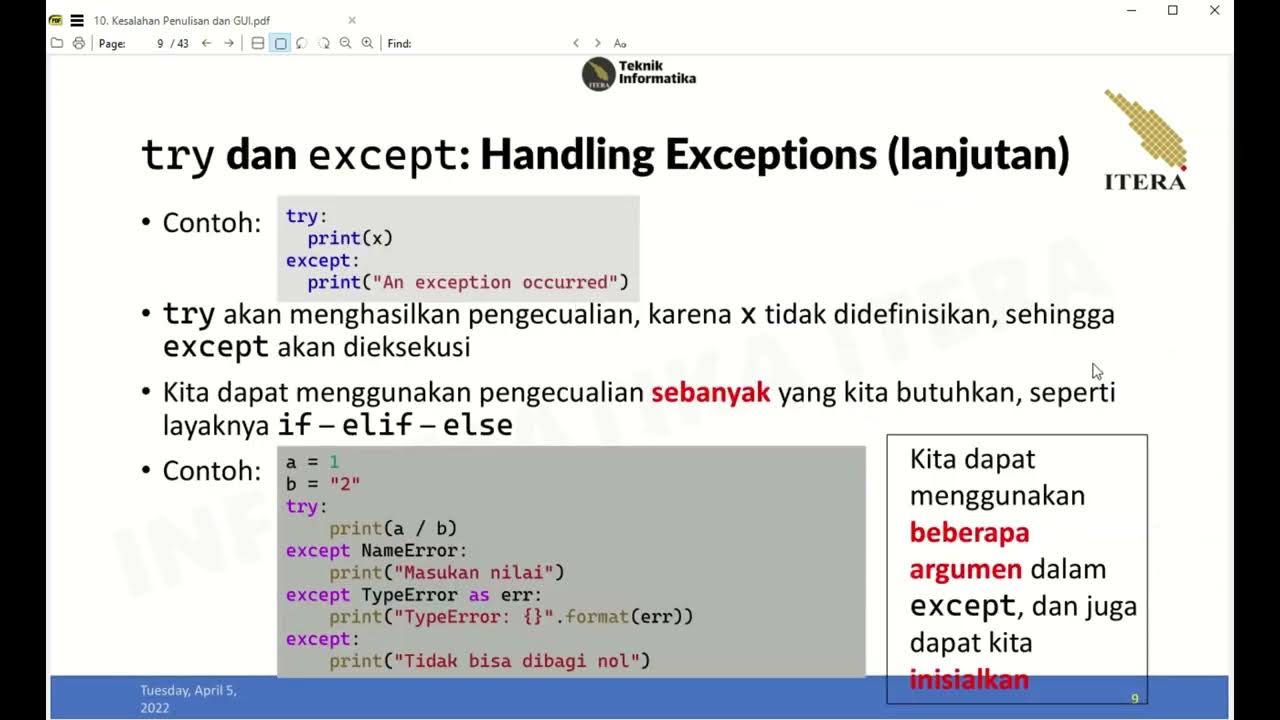70+ Trickiest Core Java Interview Questions and Answers 😱
Summary
TLDRThis video script covers essential Java interview questions and answers, focusing on try-catch blocks, exception handling, and their impact on Java application performance. It discusses the use of try-with-resources, multiple catch blocks, and how to handle multiple exceptions efficiently. The script also touches on Java's object-oriented nature, memory management, and key concepts like final variables, method overloading, and overriding. It provides insights into Java's design patterns, encapsulation, and the importance of algorithms and data structures for effective programming.
Takeaways
- 📘 The video covers most asked core Java interview questions and answers, emphasizing the importance of understanding Java fundamentals for interview success.
- 🔒 Exception handling in Java is crucial, with the try-catch block being a key concept for managing runtime errors without terminating the application.
- 🔄 Java's garbage collection mechanism is vital for memory management, and JVM uses multiple garbage collection algorithms to efficiently reclaim memory used by objects no longer in use.
- 🚀 Java is not 100% object-oriented due to its use of primitive types like int and char, which are not objects, contrasting with fully object-oriented languages.
- 🔑 The main method in Java is the entry point for any Java application, and it must be declared as public, static, and void to be accessible from any context.
- 🔍 Java's String class is immutable, meaning once a String object is created, it cannot be changed, which has implications for performance and memory usage.
- 🔗 The use of references in Java is essential for object manipulation, as Java collections like List, Map, and Set can only hold objects, not primitive types.
- 🔄 Auto-boxing and unboxing in Java allow automatic conversions between primitive types and their corresponding wrapper classes, but can lead to unexpected behavior if not used carefully.
- 🏭 The Singleton design pattern is used to ensure that a class has only one instance, providing a global point of access to it, which is useful for controlling resource-intensive operations.
- 🔄 Java's polymorphism allows objects to be treated as instances of their parent class, enabling dynamic method dispatch which is key for writing flexible and reusable code.
- 🛠️ Abstract classes and interfaces in Java are used to define templates for other classes, enforcing a contract for subclasses to implement specific methods without dictating how they should be implemented.
Q & A
What is the main topic of the video?
-The main topic of the video is to cover the most asked core Java interview questions and answers.
Why is it important to understand the 'try-catch' block in Java?
-Understanding the 'try-catch' block is important as it helps in handling exceptions in Java, allowing a program to continue execution without crashing after an error occurs.
What is the purpose of a 'finally' block in Java?
-A 'finally' block in Java is used to execute important code that must run regardless of whether an exception is thrown or caught, typically used for cleanup activities.
How does the 'try-with-resources' statement in Java help with exception handling?
-The 'try-with-resources' statement in Java is used to automatically close resources after the program is finished with them, reducing the chances of resource leaks.
What is the impact of using 'try-catch-finally' on the performance of a Java application?
-Using 'try-catch-finally' can slightly affect the performance due to the overhead of managing exceptions; however, it is generally minimal and necessary for robust error handling.
Why is it necessary to manage exceptions in Java?
-Managing exceptions in Java is necessary to maintain the stability and reliability of an application, preventing it from crashing and allowing it to handle errors gracefully.
What is the difference between checked and unchecked exceptions in Java?
-Checked exceptions are exceptions that a method must either handle or declare to be thrown, whereas unchecked exceptions (runtime exceptions) do not require mandatory handling or declaration.
How can multiple exceptions be handled in a single 'catch' block in Java?
-Multiple exceptions can be handled in a single 'catch' block by separating them with a pipe symbol '|' in the exception type, allowing the same block of code to handle multiple types of exceptions.
What is the role of the 'static' keyword in a Java method?
-The 'static' keyword in a Java method indicates that the method belongs to the class rather than instances of the class, allowing it to be called without creating an object.
Why is it not possible to override the 'main' method in Java?
-It is not possible to override the 'main' method in Java because a static method cannot be overridden as it is not associated with any instance of the class.
What are the implications of using object-oriented programming languages like Java in enterprise projects?
-Using object-oriented programming languages like Java in enterprise projects helps in organizing code better, making it easier to update, scale, and save time and effort by reusing code.
Outlines

This section is available to paid users only. Please upgrade to access this part.
Upgrade NowMindmap

This section is available to paid users only. Please upgrade to access this part.
Upgrade NowKeywords

This section is available to paid users only. Please upgrade to access this part.
Upgrade NowHighlights

This section is available to paid users only. Please upgrade to access this part.
Upgrade NowTranscripts

This section is available to paid users only. Please upgrade to access this part.
Upgrade NowBrowse More Related Video

Exception pada Pemrograman Berorientasi Objek - Python

Lecture 24: Exception Handling-II

Hospital Management System | Connecting Java Project with MySQL | Java Project with source code

File Handling in Java | Java program to create a File

Accenture Interview Experience || Selected Candidate

Eloquent Javascript: Error Propagation
5.0 / 5 (0 votes)